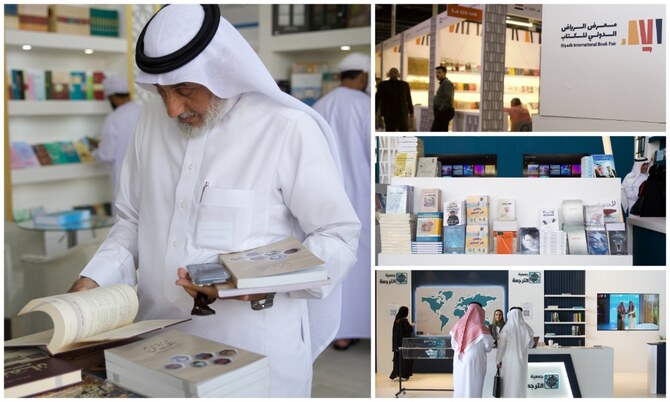RIYADH: The Riyadh International Book Fair got underway at King Saud University on Thursday under the theme “Riyadh Reads.”
This year’s fair — organized by the Literature, Publishing and Translation Commission — features more than 2,000 publishing houses from more than 30 countries, spread across 800 pavilions.
The fair will run from Thursday, Sept. 26 until Saturday, Oct. 5 with local and international publishers from around the world.
The fair will also feature cultural experiences with more than 200 events suited to all ages, such as seminars, panel discussions, lectures, poetry evenings, theatrical performances and workshops addressing a wide range of topics.
There will also be a dedicated zone for children aged 3 to 12 years, which has been put together with educational and entertaining activities for families to participate in.
The children’s area will feature a special section featuring works by Saudi authors and platforms for book signings, offering the public the chance to meet their favorite authors and get their latest releases autographed.
Saudi, other Arab and international cultural organizations and institutions will be present, making it a key platform for publishers, intellectual and cultural exchange, and a meeting point for writers, thinkers and culture and book enthusiasts from within and outside the Kingdom.
Each year the Riyadh International Book Fair welcomes a country as the guest of honor — last year it was Oman and this year is Qatar.
The fair will offer visitors an in-depth experience of Qatar’s literary and intellectual achievements, cultural heritage, history and diverse arts.
The Qatari pavilion will also display manuscripts and publications from the Qatari Ministry of Culture, and prominent Qatari cultural figures will participate in a diverse and vibrant cultural program.
“This is Qatar University’s first participation at the Riyadh Book Fair with a pavilion dedicated to Qatar University Press,” said Ali Mohammed Ali, senior marketing and communication specialist at Qatar University Press.
“Honestly, it is a special feeling you get when your country is the guest of honor, and we are very happy with this participation,” he told Arab News.
The Riyadh Book Fair kicked off with a promising turnout on the opening day, attracting a diverse group of visitors eager to explore the international and local selection of books.
“This is just the first day and, God willing, we will see what will happen with the fair on the last day,” Ali said, expressing optimism for the days to come.
The Qatari Ministry of Culture showcased its presence with a booth located at G134, while the ministry's Roza Publishing House had its own booth at D123.
As part of its role as guest of honor, the ministry promoted its “One Book, One Community” campaign, part of the broader “Qatar Reads” initiative. This program aims to foster a love for reading, and revive interest in Arabic literature across various genres.
The ministry’s booth is designed to reflect the unique architectural style of the country, and features artwork and display pieces celebrating Qatar’s rich culture, heritage, and history.
Additionally, the Qatari pavilion will include live folk art performances, along with interactive activities for visitors, enriching the cultural experience at the fair.
The book fair this year has expanded too. The theme last year was “An Inspiring Destination” and more than 1,800 publishing houses participated.
The fair is open to the public daily from 11 a.m. to midnight, except on Fridays, when it opens from 2 p.m. to midnight.



























